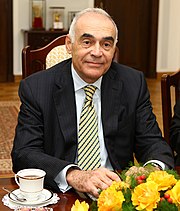Mohamed Kamel Amr
Mohamed Kamel Amr | |
|---|---|
 | |
| Foreign Minister of Egypt | |
| In office 18 July 2011 – 16 July 2013 | |
| President | Mohammed Morsi Adly Mansour (acting) |
| Prime Minister | Essam Sharaf Kamal Ganzouri Hesham Qandil Hazem Al Beblawi |
| Preceded by | Mohamed Orabi |
| Succeeded by | Nabil Fahmy |
| Personal details | |
| Born | 1 December 1942 Cairo, Egypt |
Mohamed Kamel Amr (Arabic: محمد کامل عمرو, born 1 December 1942)[1] is an Egyptian diplomat who served as Egypt's minister of foreign affairs from 2011 to 2013. He resigned from office on 30 June 2013.[2]
Early life
This section is empty. You can help by adding to it. (May 2016) |
Career
Amr began his career as a diplomat in the Egyptian Ministry of Foreign Affairs after graduating from University of Alexandria with a degree in Economics and Political Science. His first posting abroad was at the Egyptian Embassy in Addis Ababa, Ethiopia. This was followed by postings to Egyptian Embassies to the United Kingdom, The People's Republic of China and Australia. Between 1982 – 1987 he was appointed as counsellor in the Egyptian Mission to the United Nations in New York during which period he served as Egypt’s representative on the Security Council when Egypt was a non-permanent Member on the council between 1984 – 1985.[3] In this capacity, he chaired the Security Council commission[4] established by Security Council Resolution no. 571 to investigate South Africa’s attacks on Angola.
From 1989 to 1993 Amr was appointed as a Political Minister of the Egyptian Embassy in Washington, D.C.
In between postings abroad while he was at the Headquarters of the Egyptian Foreign Ministry in Cairo Amr served on the cabinets of several Foreign Ministers including Mahmoud Riyad, Mohamed Riyad, Boutros Boutros Ghali and Esmat Abdel- Meguid. He also was appointed as an Assistant Foreign Minister for African Organizations from January 1993 to September 1995. He was appointed as Egypt’s Ambassador to the Kingdom of Saudi Arabia and representative of Egypt to the Organization of Islamic Conference from September 1995 to December 1997.
From December 1997 to January 2009 Amr was appointed Alternate Executive Director, representing Egypt and 13 Arab Countries on the Executive Board of Directors of the World Bank in Washington, D.C.
Upon his return to Egypt, he was appointed as the first Executive Director of the Center for Strategic Documentation, as semi-governmental organization established to document and research the Economic and social reforms in Egypt over the recent decades, where he remained until his resignation on July 2011.
Amr was called upon to serve as Foreign Minister first in Prime Minister Essam Sharaf's government from 18 July 2011 to December 2011 when he replaced Mohamed Orabi as Foreign Minister. The appointment of Amr was part of a cabinet reshuffle demanded by protesters camped out in Tahrir Square in central Cairo. He retained his post in Kamal Ganzouri's government from 7 December 2011 to August 2012. He continued his service as Foreign Minister in Hesham Qandil's cabinet from 2 August 2012 to 30 June 2013 when he rendered his resignation to the then President Mohamed Morsi stating that he cannot continue in his role in view of the turmoil that was engulfing Egypt at that time.[5] He also announced that he would not continue in his post in the newly formed government of Prime Minister Hazem Al-Beblawy. He continued as a Care-Taker Minister until the new Minister Nabil Fahmy assumed his duties on July 16, 2013.
Ministerial activities and views
Amr was named as member of Arab diplomatic delegation, headed by Arab League chief Nabil al-Arabi, that deal with the political conflict between the Palestinian National Authority (PNA) and Israel on 27 December 2012.[6] The delegation also included Jordanian foreign minister Nasser Judeh.[6]
On 4 July 2013, Amr assured U.S. Secretary of State John Kerry in a telephone call that the overthrow of President Mohamed Mursi had not been a military coup, but a revolution.[7]
References
- ^ "Biography". Egyptian Ministry of Foreign Affairs.
- ^ "Egypt's foreign minister tenders resignation — state news agency". Trust. Retrieved 2 July 2013.
- ^ "Membership of the United Nations Security Council by Country". www.un.org. Retrieved 4 May 2016.
- ^ "UN documents" (PDF).
- ^ ""أ ش أ": محمد كامل عمرو يعتذر عن عدم الاستمرار فى وزارة الخارجية بحكومة الببلاوي". بوابة الأهرام. Retrieved 11 May 2016.
- ^ a b "Palestinian political conflict with Israel grows amid active Arab diplomacy". Xinhua. 27 December 2012. Retrieved 28 December 2012.
- ^ "Egypt foreign minister to Kerry: no "military coup"". Yahoo. Retrieved 4 July 2013.
